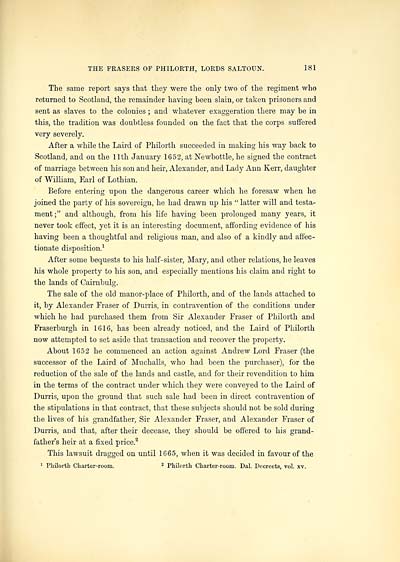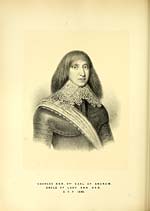Frasers of Philorth > Volume 1
(223)
Download files
Complete book:
Individual page:
Thumbnail gallery: Grid view | List view

THE FRASERS OF PHILORTH, LORDS SALTODN. 181
The same report says that they were the only two of the regiment who
returned to Scotland, the remainder having been slain, or taken prisoners and
sent as slaves to the colonies ; and whatever exaggeration there may be in
this, the tradition was doubtless founded on the fact that the corps suffered
very severely.
After a while the Laird of Philorth succeeded in making his way back to
Scotland, and on the 11th January 1652, at Newbottle, he signed the contract
of marriage between his son and heir, Alexander, and Lady Ann Kerr, daughter
of William, Earl of Lothian.
Before entering upon the dangerous career which he foresaw when he
joined the party of his sovereign, he had drawn up his "latter will and testa-
ment;" and although, from his life having been prolonged many years, it
never took effect, yet it is an interesting document, affording evidence of his
having been a thoughtful and religious man, and also of a kindly and affec-
tionate disposition. 1
After some bequests to his half-sister, Mary, and other relations, he leaves
his whole property to his son, and especially mentions his claim and right to
the lands of Cairnbulg.
The sale of the old manor-place of Philorth, and of the lands attached to
it, by Alexander Eraser of Durris, in contravention of the conditions under
which he had purchased them from Sir Alexander Fraser of Philorth and
Fraserburgh in 1016, has been already noticed, and the Laird of Philorth
now attempted to set aside that transaction and recover the property.
About 1652 he commenced an action against Andrew Lord Fraser (the
successor of the Laird of Muchalls, who had been the purchaser), for the
reduction of the sale of the lands and castle, and for their revendition to him
in the terms of the contract under which they were conveyed to the Laird of
Durris, upon the ground that such sale had been in direct contravention of
the stipulations in that contract, that these subjects should not be sold during
the lives of his grandfather, Sir Alexander Fraser, and Alexander Fraser of
Durris, and that, after their decease, they should be offered to his grand-
father's heir at a fixed price. 2
This lawsuit dragged on until 1665, when it was decided in favour of the
1 Philorth Charter-room. 2 Philorth Charter-room. Dal. Decreets, vol. xv.
The same report says that they were the only two of the regiment who
returned to Scotland, the remainder having been slain, or taken prisoners and
sent as slaves to the colonies ; and whatever exaggeration there may be in
this, the tradition was doubtless founded on the fact that the corps suffered
very severely.
After a while the Laird of Philorth succeeded in making his way back to
Scotland, and on the 11th January 1652, at Newbottle, he signed the contract
of marriage between his son and heir, Alexander, and Lady Ann Kerr, daughter
of William, Earl of Lothian.
Before entering upon the dangerous career which he foresaw when he
joined the party of his sovereign, he had drawn up his "latter will and testa-
ment;" and although, from his life having been prolonged many years, it
never took effect, yet it is an interesting document, affording evidence of his
having been a thoughtful and religious man, and also of a kindly and affec-
tionate disposition. 1
After some bequests to his half-sister, Mary, and other relations, he leaves
his whole property to his son, and especially mentions his claim and right to
the lands of Cairnbulg.
The sale of the old manor-place of Philorth, and of the lands attached to
it, by Alexander Eraser of Durris, in contravention of the conditions under
which he had purchased them from Sir Alexander Fraser of Philorth and
Fraserburgh in 1016, has been already noticed, and the Laird of Philorth
now attempted to set aside that transaction and recover the property.
About 1652 he commenced an action against Andrew Lord Fraser (the
successor of the Laird of Muchalls, who had been the purchaser), for the
reduction of the sale of the lands and castle, and for their revendition to him
in the terms of the contract under which they were conveyed to the Laird of
Durris, upon the ground that such sale had been in direct contravention of
the stipulations in that contract, that these subjects should not be sold during
the lives of his grandfather, Sir Alexander Fraser, and Alexander Fraser of
Durris, and that, after their decease, they should be offered to his grand-
father's heir at a fixed price. 2
This lawsuit dragged on until 1665, when it was decided in favour of the
1 Philorth Charter-room. 2 Philorth Charter-room. Dal. Decreets, vol. xv.
Set display mode to:
![]() Universal Viewer |
Universal Viewer | ![]() Mirador |
Large image | Transcription
Mirador |
Large image | Transcription
Images and transcriptions on this page, including medium image downloads, may be used under the Creative Commons Attribution 4.0 International Licence unless otherwise stated. ![]()
| Histories of Scottish families > Frasers of Philorth > Volume 1 > (223) |
|---|
| Permanent URL | https://digital.nls.uk/96568176 |
|---|
| Attribution and copyright: |
|
|---|
| Description | A selection of almost 400 printed items relating to the history of Scottish families, mostly dating from the 19th and early 20th centuries. Includes memoirs, genealogies and clan histories, with a few produced by emigrant families. The earliest family history goes back to AD 916. |
|---|

